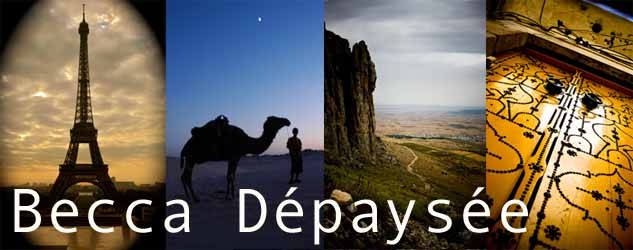This week’s “language socialization” took us to the ancient ruins of the amphitheater in Carthage for a joint performance by the Tunisian and Moroccan orchestras. The atmosphere was perfect—a cool night with a slight breeze that jostled through the blue- and purple-lit foliage of the trees on either side of the stage, seemingly to the beat. We opted to skip the VIP chairs in the front that the program had paid for in favor of the stone “bleachers,” which provided a better view of the orchestra as well as an authentic ancient feel that complimented the subject of the Tunisian symphony: “Hannibal Barka.” I found the symphony itself to be surprisingly Western. There were brief interludes of more Tunisian-inspired percussion (which elicited cheers from the audience every time), but other than that, the music sounded pretty similar to other classical music I’ve heard. Even though I didn’t understand more than a few words, I enjoyed the Arabic storytelling narration at the beginning of the show, which set the stage for an epic battle that the later march-like tempo and dramatic score of the second movement followed up on.
We had an interesting moment of cultural contact with a snack vendor before the show. Jonesing for something sweet, I called him over to buy some candied peanuts. I was digging for change in my pocket when he suddenly said “Aiiee!” and grabbed his finger, which had just been bitten by two huge wasps. Trying to help him, David came over, only to begin flailing as the wasps changed their focus to him and left him with a matching red welt. The Tunisian women next to us laughed at David, and a few people took pictures as the vendor and him commiserated over the stings…an odd moment, but I suppose shared pain is as good a way as any to break the ice.
The latest “lecture” in our Monday series also had a music-theme. The guest speakers were a pair of academic musician sisters; the elder used to be a somewhat famous local musician but gave it up to study American literature with a focus on African American lit (this seems to be an interest I’m running into again and again among lit scholars over here…I wonder what the attraction is? Do they identify with the racial identity? Or as the ex-colonized, is it more of a sympathy for the marginalized group within a dominant culture?) The younger is a still-famous local singer, who shares the AA lit focus. The sisters brought along two male accompanists—one on the darbooka, or Tunisian ceramic drum, and the other on a Kanun: a stringed, hammer-dulcimer-looking instrument that is plucked with the fingers like a flat harp. They performed a range of beautiful Tunisian folk songs as we clapped and danced, and (much to my delight) talked a lot about the relationship between music, storytelling, and women. Apparently it is becoming much more P.C. for women to be musicians these days, but the transition is pretty recent—the eldest sister cited the disapproval of her father and the threat of scandal as her reasons for retiring her early music career in favor of the more reputable work of academia. Even today, she said, women who want to be musicians must have a respectable education or job on the side if they expect respect (although recent changes in the Tunisian public education system have made music study mandatory for all Tunisian children…which you could argue is better than the states, where arts and humanities are increasingly being cut from curricula when budgets get tight). This sister also published a book about Tunisian women as storytellers, for which she interviewed three old women, translated their stories and analyzed how the themes of their stories both overlap and reflect their individual lives. I stole a copy from the community bookshelf, so I’ll let you know what I think in a week or so…

No comments:
Post a Comment